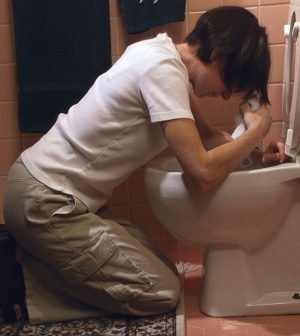- Could Your Grocery Store Meat Be Causing Recurring UTIs?
- Are You Making This Expensive Thermostat Error This Winter?
- Recognizing the Signs of Hypothyroidism
- 10 Strategies to Overcome Insomnia
- Could Artificial Sweeteners Be Aging the Brain Faster?
- Techniques for Soothing Your Nervous System
- Does the Water in Your House Smell Funny? Here’s Why
- Can a Daily Dose of Apple Cider Vinegar Actually Aid Weight Loss?
- 6 Health Beverages That Can Actually Spike Your Blood Sugar
- Treatment Options for Social Anxiety Disorder
How to Survive a New Year’s Hangover

Excess drinking on New Year’s Eve can lead to a painful morning after, with no sure-fire cure available. But helpful strategies for treating a hangover do exist.
Hangover symptoms — headache, nausea and dizziness — occur when the body withdraws from alcohol and a chemical called acetaldehyde is produced, Dr. Robert Glatter, an emergency physician at Lenox Hill Hospital in New York City, said in a hospital news release.
The only “cure” at present is to not imbibe in the first place. Glatter said that the U.S. Food and Drug Administration has not approved any treatments for a hangover and isn’t likely to do so anytime soon.
Instead, he offered these suggestions:
- Drink in moderation, and eat before you drink. That’s because the food will slow the absorption of the alcohol. A meal with high levels of protein and fat may do an especially good job of slowing the alcohol absorption process.
- Snack throughout the evening and night to slow the absorption of alcohol. This also helps keep your blood sugar levels steady.
- Be cautious around darker alcohols, such as red wine, bourbon and whiskey. They contain more toxic chemicals, called congeners, that are produced during the fermentation process. These can boost the risk of a hangover headache.
- To reduce the impact of a hangover headache, take a nonsteroidal anti-inflammatory painkiller before going to bed. Examples are aspirin, Advil and Aleve.
- Drink slowly and make every other drink a non-alcoholic beverage, like water. Also consider drinks like Powerade and Gatorade, which can restore your body’s electrolyte levels.
- If you develop a hangover headache, try drinking the soft drink Sprite, which contains a compound called taurine that may be helpful.
There’s one other important thing to remember the morning after: Watch out for caffeine because caffeinated drinks can boost your heart rate and worsen dehydration, Glatter said.
More information
The U.S. National Library of Medicine has more on treating hangovers.
Source: HealthDay
Copyright © 2026 HealthDay. All rights reserved.










